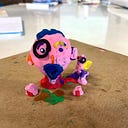Writing Prompt #1: The Wounded Storyteller
What are the stories that you tell about your health?
In ‘The Wounded Storyteller: Body, Illness, and Ethics,” Arthur Frank writes:
People tell stories to make sense of their suffering; when they turn their disease into stories, they find healing.
Writing Prompt: What are the stories that you tell about your health?
- Free-write for ten minutes, without pause or self-editing.
The stories I told about my health didn’t come from me, they were stories that had been told and repeated and taken as the truth.
I was a sick child. When I was two months old, I had a collapsed lung, and then a series of bronchial infections and severe asthma. I was born in Jerusalem, and when I was three years old my mother, sister and I moved to Boston to get better medical care. She left to save my life, is the story I knew. My earliest memory is from Boston. We went to the hospital to get an x-ray or a scan of my lungs, and I brought my stuffed animal with me, a small dalmation in a seated position. At the hospital they did a scan of the stuffed animal too, and I brought it with me to show my class at preschool.
I’ve been thinking about the past more, about the doctors and appointments and the stories. It was a confusing childhood.
In Boston I saw a doctor who prescribed a medication to treat the asthma. I saw many doctors in childhood, and later in life too. This doctor had a stern face and thin rimmed glasses. When he put the stethescope to my stomach, I would giggle, ticklish. He didn’t laugh.
My health stabilized, though every winter I would get a cold that became an infection that became a racking cough that startled those around me. I was a small child, a little girl, who usually sat shy and quiet. The cough was loud (‘like the bark of a seal’), and it lasted for a while after the infection ended.
Then there was the sequence of ear infections, and strept throat that came and went and came again, until it I had my tonsils removed.
As a child, you don’t know anything other than what you experience, and what is reflected around you. I experienced myself as sick, fragile. Silent and compliant, a model patient. The doctor appointments were a stable part of growing up, the doctors themselves reassuringly predictable. At home, things felt uncertain, unstable. There was shouting, and doors slamming, and a younger sibling who had tantrums that shook the walls. The police came, and left. More than their presence, it was the intimidation of the presence that I remember.
(it’s one more minute on the clock, are you surprised by what emerged? it’s emerging still, it’s memories that have been submerged and shadowed by years of silence. This isn’t your story yet. It’s uncovering that which your story is contained within. It’s the first part of your storyteller’s journey, a letting go, a writing for twenty five minutes.
The Quest Narrative:
(…) The ill person meets suffering head on; they accept illness and seek to use it. Illness is the occasion of a journey that becomes a quest.
